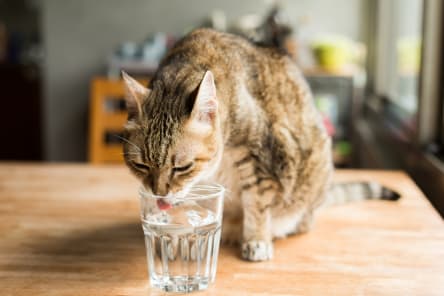What is kidney failure in cats?
When your cat’s kidneys are healthy, they help to manage blood pressure, remove toxins, regulate hydration and calcium, maintain a normal electrolyte balance and produce hormones which stimulate the production of red blood cells.
Kidney failure is also known as renal failure. If your cat experiences the condition, the kidneys will no longer function efficiently.
This can be caused by numerous factors, including tumors, infections or eating something toxic.
The immediate risk of failing kidneys in cats is that the blood will not be cleared of dangerous toxins.

What are the different types of kidney failure in cats?
There are two types of kidney failure in cats. Each type has different causes, treatment options and prognosis.
Acute Renal Failure
If your cat experiences acute kidney failure, their kidneys will be suddenly unable to function correctly. This type of kidney failure happens suddenly — within days or weeks. If diagnosed quickly, acute renal failure can often be reversed.
The condition can occur in cats of any age and usually results from infection, organ failure, trauma, poisons, dehydration, urethral blockages and other causes. Poisons such as pesticides, toxic plants, human medications and cleaning fluids are the most common cause of acute renal failure.
Chronic Kidney Failure
This type of kidney failure is more gradual. It typically develops over many months or even years. Chronic kidney failure is usually caused by cysts in the kidneys, genetics and autoimmune diseases.
The condition is a progressive illness that can result in total kidney failure, where the kidneys gradually stop functioning as they lose the ability to filter toxins from the blood.
What are the symptoms of kidney failure in cats?
If your cat’s kidneys have stopped removing waste from his or her body, you may notice your cat is drinking more water and trying to urinate more. Because toxins are accumulating in the cat’s body, they may feel nauseated and quit eating their food. Generally, your cat will appear lethargic and not very happy.
Typically, symptoms of kidney failure in cats may include:
- Depression
- Bad breath
- Dehydration
- Vomiting (may contain blood)
- Diarrhea (may contain blood)
- Lack of appetite
- Weight loss
- Excess thirst
- Weakness
If your cat is suffering from acute kidney failure you may also notice an arched back or stiff-legged gait, symptoms that your cat’s kidneys are causing pain.
Chronic kidney failure gradually progresses over years, and the signs may not be noticeable. By the time you do see symptoms, the disease may already be leading to total kidney failure.
While there is no cure for chronic kidney disease, if it’s detected and treated early your cat’s longevity and quality of life can be improved.
What are the symptoms of end stage kidney failure in cats?
Symptoms of end stage kidney failure in cats include dull sunken eyes, inability to walk, body odour, incontinence in bladder or bowels, refusal to eat or drink, seizures, confusion, pacing and restlessness, withdrawing, hiding and running away.
Though more than one of these symptoms will be present, you may not see all of them in your cat. With kidney failure, there are no easy answers, as different symptoms may be present at different times.
These symptoms can also be signs of other illnesses, which is why early diagnosis, disease management and communication with your vet is critical.
How is kidney failure in cats diagnosed and treated?
Your vet will do a comprehensive examination of your cat, including blood and urine tests, X-Rays, and possibly an ultrasound. A kidney biopsy might also be required to diagnose kidney failure.
If kidney disease is found, treatments could include intravenous fluids to correct dehydration, vitamin injections, supplements, medications, and possibly surgery to remove blockages. When treating kidney failure the goal is to manage the symptoms and slow down the progression of the disease.
You can support your cat’s treatment with a carefully managed diet and plenty of clean fresh water. Your vet will recommend that you gradually transition your cat to a kidney diet that is low in both phosphorus and protein, and is enriched with vitamin D and omega-3 fatty acids.
For cats with end-stage kidney failure, they will require palliative care in their final days will mean keeping them warm and comfortable, with food, water and a litter box nearby, as well as lots of loving human companionship.
Note: The advice provided in this post is intended for informational purposes and does not constitute medical advice regarding pets. For an accurate diagnosis of your pet's condition, please make an appointment with your vet.
